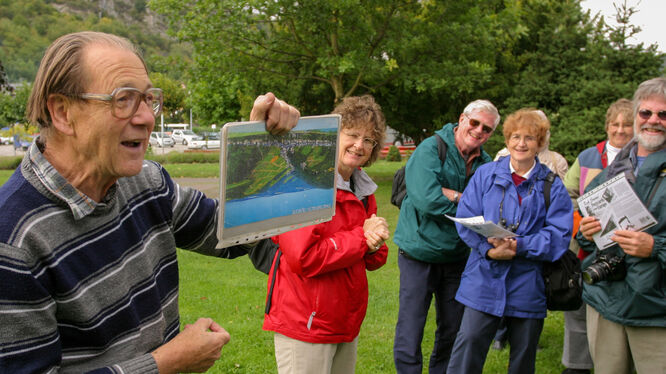Memories of War in Bacharach
By Rick Steves
Under a castle, surrounded by vineyards, the medieval village of Bacharach sleeps peacefully on the Rhine. This pleasant half-timbered village with vine-covered hillsides was once prosperous from its wine and wood trade, and now works hard to keep tourists happy.
On one visit, while strolling along its riverside park with the mighty Rhine on one side and the town's medieval walls on the other, I found my thoughts drifting off to imagine I was in another age…until two castle-clipping fighter jets from a nearby American military base rip through the silence.
The Rhine Valley is stained by war. As the last of the World War II survivors pass on, memories fade. The war that ripped Europe in two — as it did the lives of its survivors — will become like a black-and-white photo of a long-gone and never-known relative on the mantle.
On its riverside, Bacharach has an old war memorial that seems pointedly ignored by both the town and its visitors. Its huge sandstone bricks, marked with an Iron Cross and flanked by two helmets, were erected in 1914 to honor local veterans of the then-underway World War I, as well as of five previous wars…but the inscribed names and dates are now mostly illegible.
I once I asked my good friend Herr Jung to translate the words I can still make out.
"To remember the hard but great time…" he started, then muttered, "Ahh, but this is not important now."
For all its many charms, Bacharach is probably my favorite Rhine Valley town because of my friendship with Rolf Jung, the town's retired and much-adored schoolmaster. With each visit he would take me on a thought-provoking walk of his hometown. Herr Jung passed away in 2019, but when I close my eyes, I remember vividly the stories he shared with me as he'd lead me through the back lanes of his hometown…and I still hear his caring teacher's voice.
"We Germans turn our backs on the monuments of old wars," he explained. "We have one day in the year when we remember those who have died in the wars. Because of our complicated history, we call these lost souls not war heroes but ‘victims of war and tyranny.' Those who lost sons, fathers, and husbands have a monument in their heart. They don't need this old stone."
His vivid accounts of wartime Bacharach are unforgettable. "I remember the sky," he once told me. "It was a moving carpet of American bombers coming over that ridge. Mothers would run with their children. There were no men left. In my class, 49 of the 55 boys lost their fathers. My generation grew up with only mothers."
"I remember hiding in our cellar, praying with my mother. I was a furious dealmaker with God. I can still hear the guns. Day after day we watched American and Nazi airplanes fighting. We were boys. We'd jump on our bikes to see the wreckage of downed planes. I was the neighborhood specialist on warplanes. I could identify them by the sound."
"One day a very big plane was shot down. It had four engines. I biked to the wreckage, and I couldn't believe my eyes. Was this a plane designed with a huge upright wing in the center? Then I realized this was only the tail section. The American tail section was as big as an entire German plane. I knew then that we would lose this war."
The years after the war were hungry ones. "I would wake in the middle of the night and search the cupboards," he said. "There was no fat, no bread, no nothing. I licked spilled grain from the cupboard. We had friends in New York and they sent coffee that we could trade with farmers for grain. For this I have always been thankful." He locked eyes with me as he finished this story: "When I think of what the Nazis did to Germany, I remember that a fine soup cooked by 30 people can be spoiled by one man with a handful of salt."
When I think of how Herr Jung dedicated his life to sharing his generation's hard history so others can learn from it, I recommit myself to sharing the lessons travel can teach us as widely as I can.

